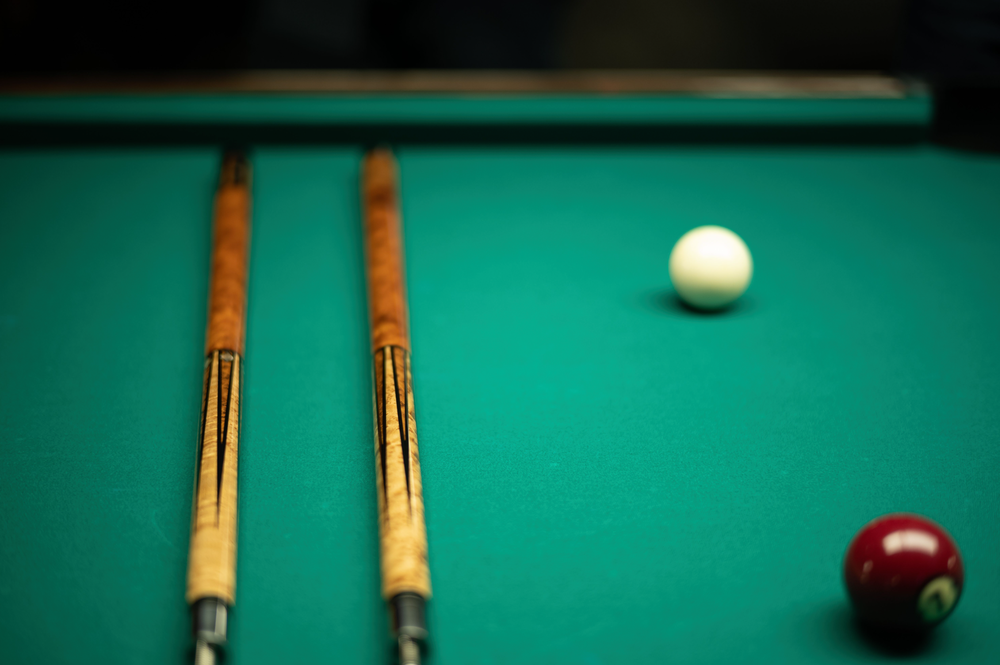
Beginner Pool Cues — Your Ultimate Guide
Table of Content
Why the Right Pool Cue Matters: A Beginner’s Guide
Pool cues may look like they're created equally until you finally pick one up and begin playing. Then you'll realize there's a difference between hard rock maple and other materials, or that certain wrap fabrics can create an awesome grip.
While you'll learn about your optimal cue through trial and error, you don't have to blow through loads of cues and money trying to get yourself in the ballpark. The advice ahead is geared toward beginners looking for affordable, dependable beginner pool cues (have you seen Seybert's custom cues?).
Highlights
- Not all pool cues are created equal. You should consider your experience level, height, and budget when selecting one.
- Playing with various cues will help you determine which one is right for your needs.
- The right cue makes it easier to learn to play pool, while a mismatched cue will make the game unnecessarily difficult.
Pool Cues 101 — The Anatomy of a Pool Cue
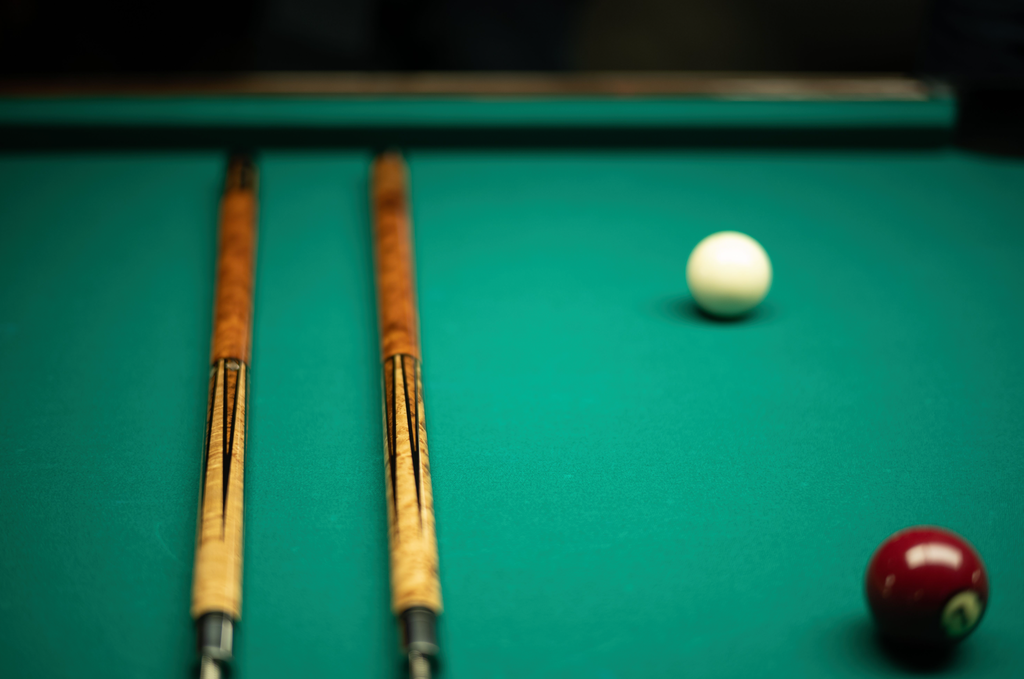
A professional pool cue is made up of two main parts: a shaft and a butt, which can be purchased separately or as a set.
Each of the two has several components of its own. Here are all the parts of a cue stick, listed from top to bottom.
Tip
The uppermost point of a cue is called the tip. This is the part of the stick that makes contact with the ball, so it has various levels of resistance depending on the hardness of its material. Most cue tips are between 12.75 and 13 millimeters in length.
Ferrule
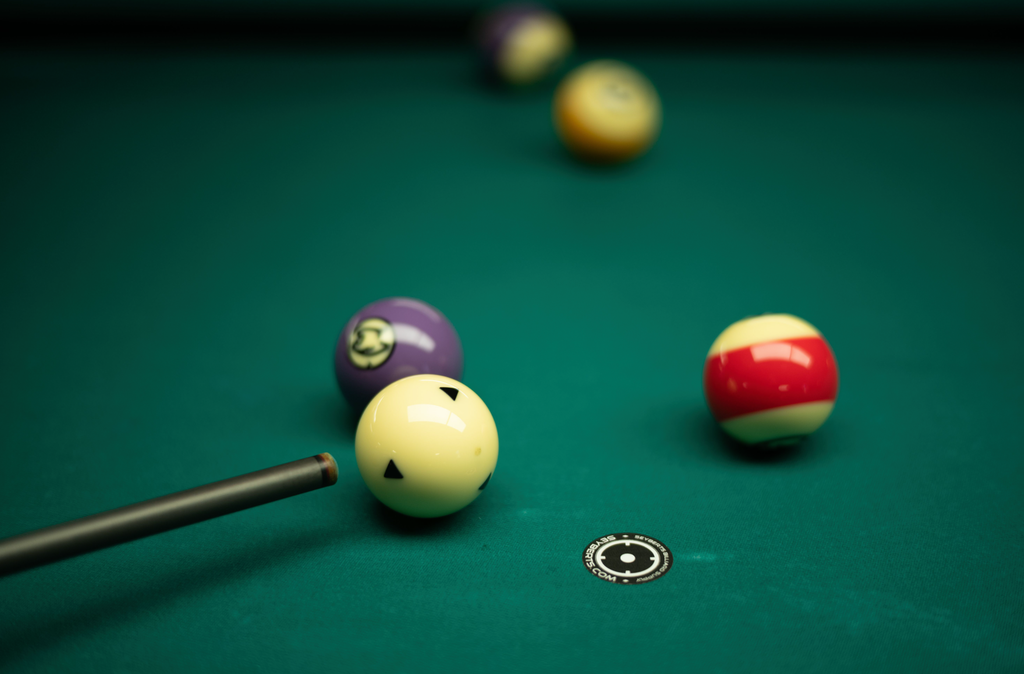
The ferrule is located directly below the tip and serves to reinforce it. Ferrules are available in a litany of materials, including titanium, stainless steel, nickel, copper, carbon steel, bronze, brass, and aluminum.
Some ferrule materials are stronger than others, but tougher ones tend to weigh more.
Shaft
The shaft is the main part of a pool cue, which connects to a separate decorative forearm with a collar going around the back. It may be made of all wood or metal.
Shafts often have a moderate degree of tapering, with the pro taper being the most common type. Pool cues in this style maintain their diameter at least 10 inches from the tip, sometimes going up to 15. Then the shaft gradually tapers, getting thicker around the butt.
Joint
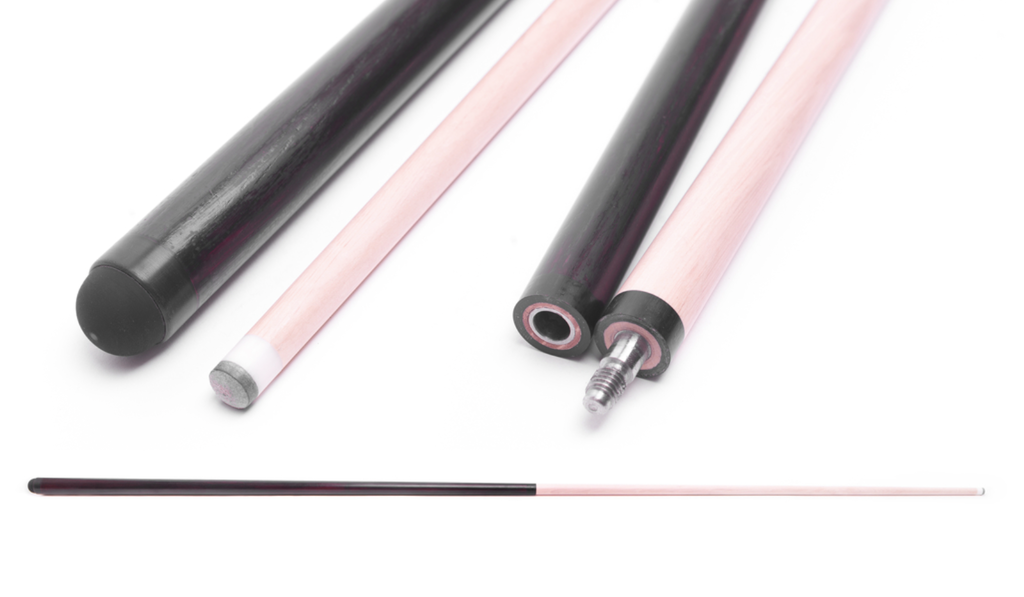
The joint connects the two main parts of a cue and consists of a connective pin, a collar connecting the shaft to the butt from the outside, and a ring that reinforces the connection.
A good choice of material for all parts of the joint is essential, as it lets energy effectively travel from the butt to the shaft, apart from strengthening the pin. The collar is usually glued into place, then threaded, and comes in materials like phenolic resin, wood, or even ivory.
Forearm
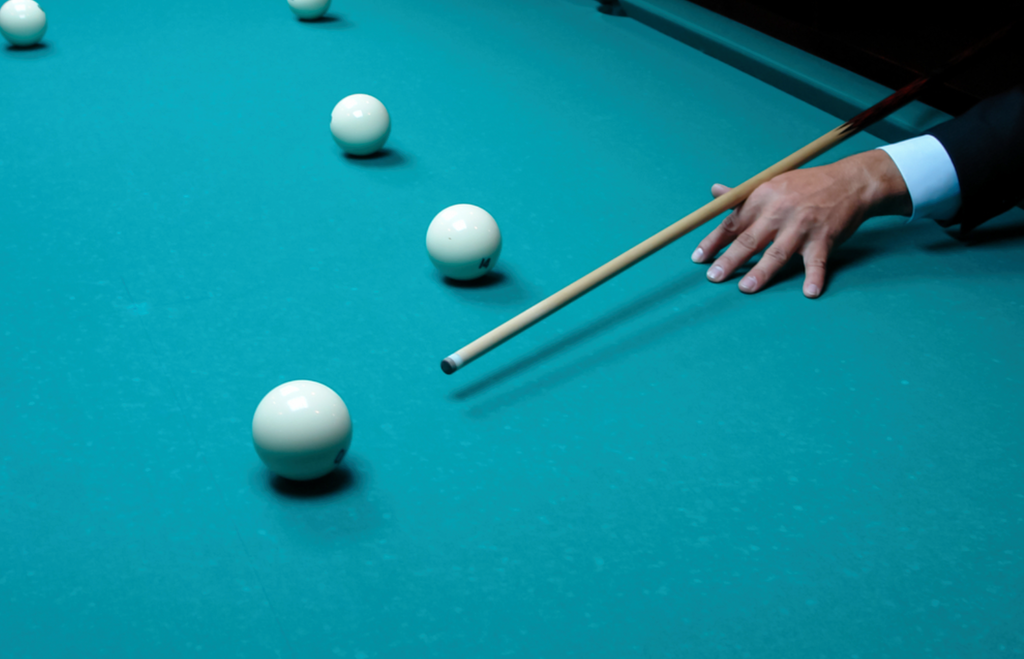
A forearm is a decorative segment of the butt which can make up the majority of the cue’s price tag, due to the cost of the materials involved.
Wrap
A wrap, also known as a grip, is installed on the butt’s handle and can help your fingers stay secure on the cue. It also serves to absorb moisture.
Bumper
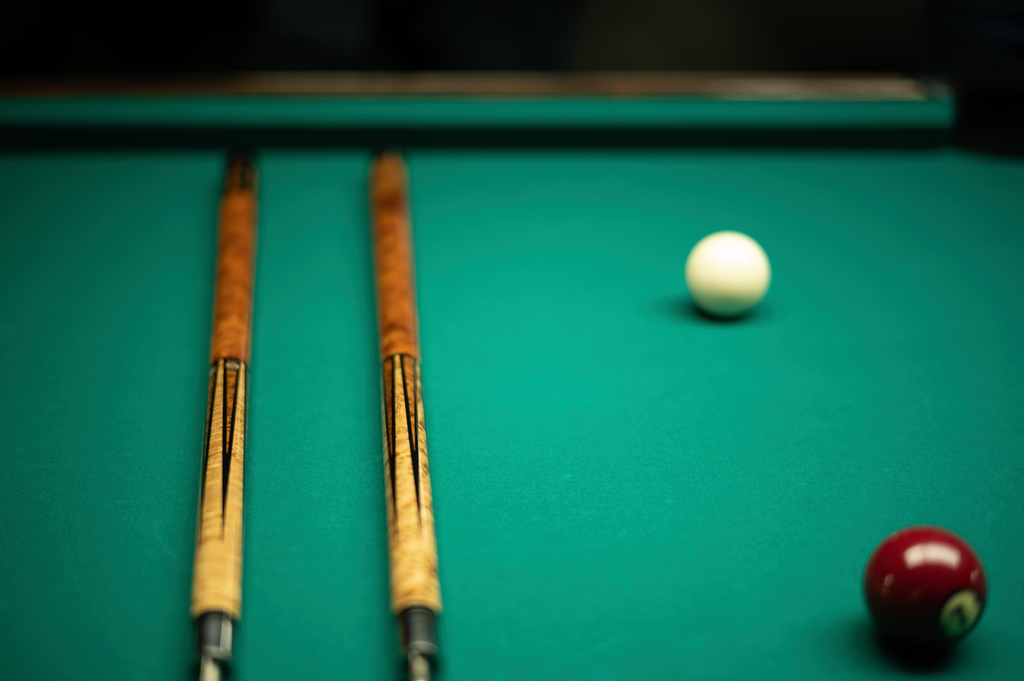
The bumper is the end of the cue that absorbs impact when you strike the ball. Rubber composite is a popular material for bumpers to prevent damage.
Summary: Pool cue components include a tip, ferrule, shaft, joint, forearm, wrap, and bumper.
How to Select a Beginner's Pool Cue
Remember these tips when you’re shopping for beginner pool cues:
Consider the Tip Material
A hard cue tip reduces spin since it absorbs less impact when colliding with the ball. While miscues are likelier with a hard cue, the material lends the tip more durability.
By comparison, a softer tip absorbs all the collision impact and creates a greater degree of spin. However, the softer material leaves the cue prone to bending. A medium tip is a good in-between solution.
Pick a Good Weight
A light pool cue is easy to pick up and play, lending it appeal to beginners. However, you will struggle to spin the ball when compared to a heavier cue, which offers more leeway, so a few egregious mistakes won't destroy your game.
Just like with the tip material, midweight pool cues might suit you well as a beginner. Weight-adjustable options are some of the best ones, as you can configure the weight as you wish.
To Wrap or Not to Wrap
Having a wrap to help your grip security is important, as you'll be less likely to make careless mistakes.
Pool cues are available in many wrap materials, including Irish linen, standard and stacked leather, and rubber.
Irish linen is soft and appealing but can get dirty after only a few games. It's also slippery.
Standard leather provides more grip, as does stacked leather, which is stylized like linen but has the same perks as a leather wrap.
Rubber wraps offer the best grip by far, which is especially good if you sweat a lot.
Pool cues don't need wraps, per se. The no-wrap cues are designed to be grippier across the shaft.
Choose by Shaft Deflection
Higher-quality pool cues favored by professionals will have a built-in low-deflection technology to improve straight and side-spin shots, especially the latter.
Considering how forgiving low shaft deflection is, if you have the option to go for it, you should always take it!
Select a Complimentary Length
Pool cues are available in varying lengths, with the shortest cues sizing 36 inches and the longest 58. The cue you select should be commensurate with your height. An average-sized adult who's between 5'8" and 6'5" can use a 58-inch cue with no problem.
Trying to play with a stick that's too long for you can impact your degree of control, as you'll find it harder to accurately shoot. A too-small cue can also hurt your control, as the ball will behave unpredictably.
Contemplate the Material
Pool cues come in all sorts of materials, including plastic, aluminum, carbon fiber, graphite, fiberglass, wood, or hybrid materials. It affects the cue's longevity and weight, so it's about more than just looks.
Summary: Choosing a pool cue requires careful consideration of the material, length, grip, level of shaft deflection, and weight.
Factors That Go into Selecting a Pool Cue
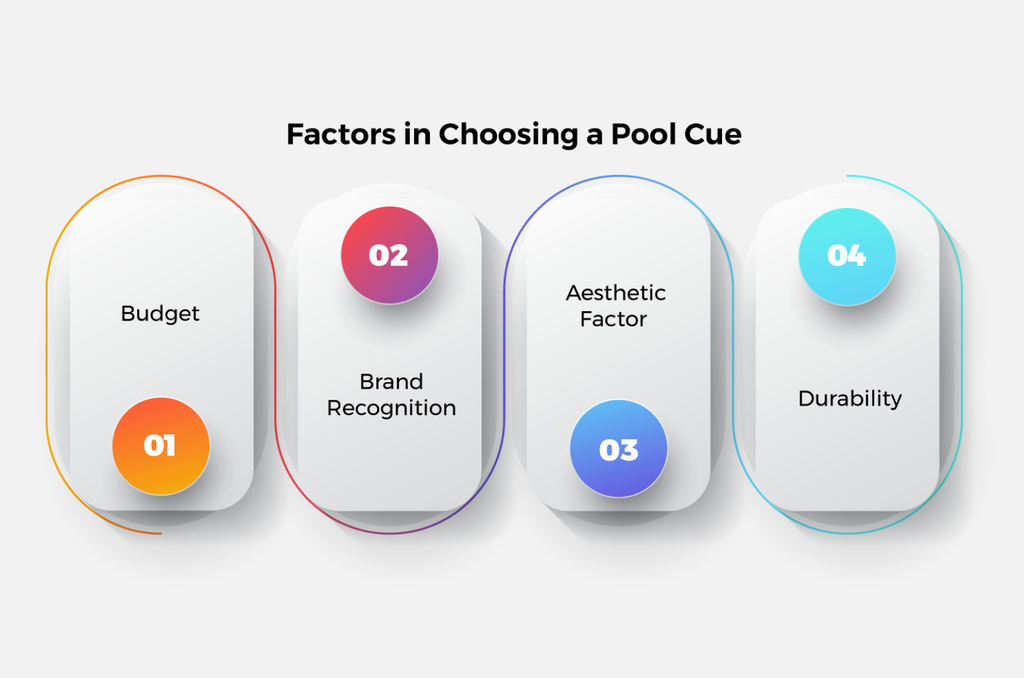
As you weigh your pool cue options, the following factors might also influence your purchasing decision.
Budget
Beginner cues start as low as $35, while on the upper end, it's not unheard of to pay several hundred or thousand dollars for the best pool cue. You should plan a budget before you begin browsing for cues and stick to it.
Brand Recognition
From Lucky Cues to McDermott Cue, Action Cues, and Seybert's Billiard Supply, brand recognition matters. Here at Seybert's, we pride ourselves on the quality of our cues and cue supplies that we are an authorized dealer for. Many agree they're the best pool cues they've tried!
Aesthetic Factor
A cue isn't exclusively about the way you play the game. You may also care about the way it helps you appear cool. You'll feel like you've gotten exceptional value if your cue shaft and butt are decorated ornately or if your cue has a fancy wrap.
Durability
The last factor to keep in mind when shopping for pool cues is their longevity. Generally, the cheaper the cue, the less of a lifespan it has. However, misusing or being too rough on your cue can cause it to incur damage faster, no matter how much you spend on it.
Summary: Durability, looks, and brand are three of the most important factors when shopping for the best pool cues.
The Benefits of the Right Pool Cue
So many pool cues, and so little time. The following reasons will help you prioritize what matters the most in your search.
Makes It Easier to Learn
The best pool cues for beginners can effortlessly strike the cue ball, helping you master the basics of performance. Once you've got those fundamentals down, you can find your own style and continue building on that with each subsequent game of pool.
Improves Your Game
Even once you've got the fundamentals down pat and left beginner status, a good pool cue is still advantageous. You'll have more precision when you shoot, better performance, more accuracy, and reliability.
Makes Playing More Enjoyable
You don't want to have to worry about what would happen in case your cues warp. If you spend time seeking a well-constructed cue and accept no substitutes, you'll enjoy every game of pool way more.
Summary: Playing with the right pool cue will help you learn the game and quickly improve performance.
Wrapping Up
Beginners learning to play pool should carefully select cues. There's a whole wide world out there besides the basic cues found at your local bar. Higher-quality products are less likely to break and have better shafts and a stronger grip.
Explore a versatile selection of five-star pool cues right here at Seybert's. Our cues range from options for beginner players to those catering to more experienced pool experts.


